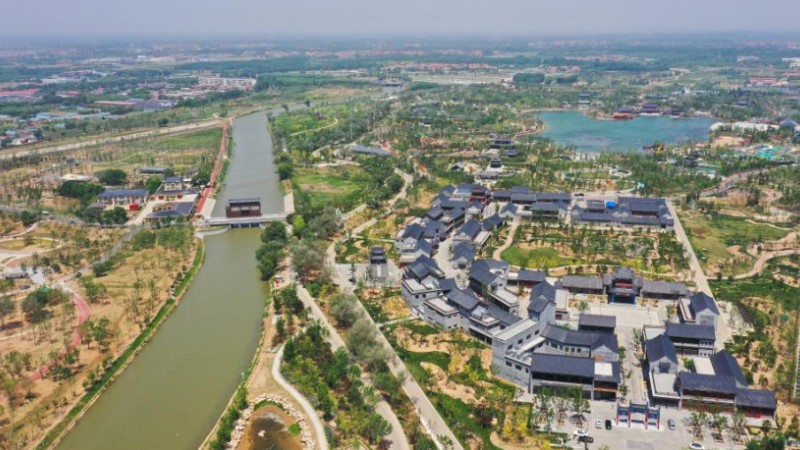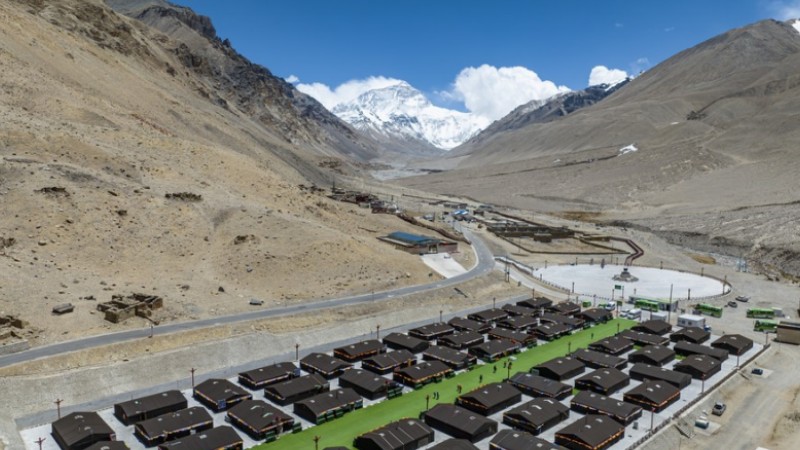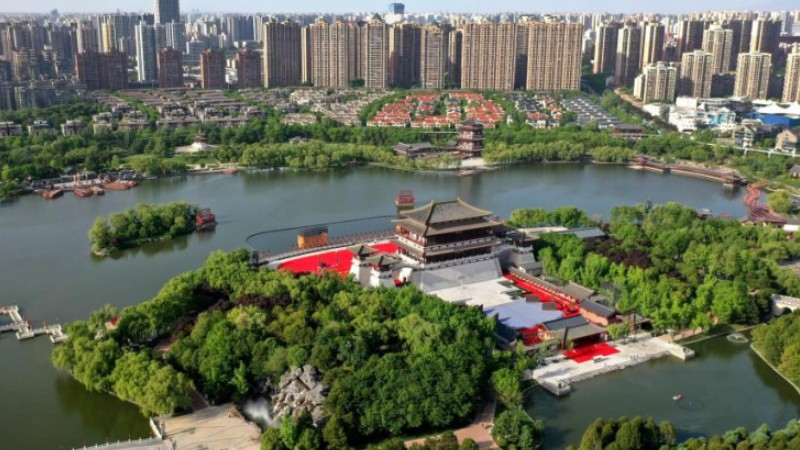Xizang’s vitality, prosperity shine at key development forum
People's happiness is the ultimate human right, while development holds the key to delivering better lives to the people, Chinese President Xi Jinping said in his congratulatory letter to "2023 Forum on the Development of Xizang, China" held in Beijing on Tuesday, May 23, the 72nd anniversary of the region's peaceful liberation.
Since the 18th National Congress of the Communist Party of China (CPC) in 2012, people in Xizang, with the strong support of the central government and people throughout the country, have worked with fortitude and brought about a resolution to the problem of extreme poverty that had plagued the region for centuries, the letter said. Xizang has achieved a moderately prosperous society in all respects along with the rest of the country, demonstrating vibrant and thriving scenes.
The vitality and prosperity of Xizang not only impressed more than 150 diplomats, scholars and industry representatives from 36 countries and regions at the Tuesday forum, but also constituted a loud rebuttal to some groundless attacks and smears against China's policy and governance in Xizang.
Li Shulei, a member of the Political Bureau of the CPC Central Committee and head of the Publicity Department of the CPC Central Committee, also delivered an address to the Tuesday forum.
The Global Times learned from the forum that Xizang's GDP and GDP per capita reached 213 billion yuan ($30 billion) and 58,438 yuan in 2022, a jump of 347 and 110 times from the time of peaceful liberation 72 years ago. People's life expectancy doubled from 35.5 years in 1959, the time of democratic reform, to 72.19 years today. People in Xizang enjoy free education for 15 years.
The numbers are the best illustration of Xizang's achievements in development and human rights protection, said Yan Jinhai, Deputy Secretary of the CPC Xizang Autonomous Regional Committee and Chairman of the People's Government of Xizang Autonomous Region.
Impressive achievements
After visiting Xizang Autonomous Region, foreign delegates hailed the region's modernization from infrastructure progress to economic leaps, while being impressed by the effective protection of local culture and ecological preservation.
The delegation took a high-speed train from regional capital Lhasa to Nyingchi, Xizang's first electrified railway that opened in 2021. Many forum attendees mentioned the experience to the Global Times as a vivid example of Xizang's high-quality development.
In Xizang, remote cities are connected through bullet trains, roads and other transportation, which established the basis for economic development, Nepali Ambassador to China Bishnu Pukar Shrestha told the Global Times at the event.
Maria Gustava, the Mozambique Ambassador to China, in her speech at the forum opening ceremony hailed a modern Xizang that has well-connected infrastructure as well as advanced telecommunications systems, including 5G internet.
Gustava told the Global Times that through Xizang's development miracle of poverty alleviation, she saw the philosophy of inclusiveness - each region should develop based on its own conditions and protect and preserve local cultures. African countries can learn from China's experience and further cooperate on poverty reduction and rural development, she said.
Alexander Birle, chief representative of Germany's Hanns Seidel Stiftung in China, told the Global Times on Tuesday that Xizang's development focus is not only on the economic aspect, but also ecological protection and the preservation of cultural relics and heritage.
Xizang is a strategic national ecological security barrier and a national experimental area for green development. Efforts include monitoring of glaciers, constructing national parks and reserves, accelerating the green transformation in industry and society and preserving the invaluable land, according to the forum.

Thirteen Chinese scientists display the Chinese national flag on the summit of Mount Qomolangma after reaching the summit on May 23, 2023. After that, they are expected to complete important scientific tasks such as collecting snow and ice samples from the summit. This is the first time that China's Everest expedition has reached an altitude above 8,000 meters since 2022. Photo: Xinhua
Breaking stereotypes
The development of Xizang is evident for all to see, yet it has always been accompanied by noises from the outside world. Some Western media or politicians turn a blind eye to the facts of Xizang's development and instead engage in deliberate slander. Some arguments are baseless and merely serve as a tool to attack China.
One recent clamor from the West and anti-China forces revolves around accusations leveled at boarding schools in Xizang. Recent reports claim that "the Chinese government is attempting to eradicate Tibetan culture altogether."
However, the Global Times visited boarding schools in Xizang at the end of March, and the reality is quite different - Tibetan language education and the preservation of traditional culture are integral parts of education in Xizang, and they are well-reflected in boarding schools.
Boarding schools are suitable for Xizang's unique geographical environment as they provide formal education to students from remote areas, holding significant importance in nurturing more talents locally.
Vikash Kumar Singh, a lecturer at the Asia Institute of Beijing Foreign Studies University from India, told the Global Times on Tuesday that people in Xizang stick to their own traditions and culture, like their dances, music, food and Thangka painting, in opposition to Western claims that Xizang culture is in danger.
Xizang is keeping its traditions while developing, and Xizang people also have the right to offices with air conditioning, cinemas and bullet trains, Singh said.
The "Tibetan government-in-exile" and some overseas anti-China organizations try to use religion, "human rights" and other topics to undermine social stability in Xizang, but Abdilahi Ismail Abdilahi, a teacher at Beijing Foreign Studies University from Somalia said "When you arrive in Xizang, you can realize that everything is different from what you have heard in some media."
"As long as you get to Xizang and see with your eyes, you could realize what is going on in Xizang," he said, noting that the experience of Xizang's development could also inspire that in African countries.
Guillaume Guibe, a French employee of China Petroleum &Chemical Corporation said that the criticisms and stereotypes in the West about Xizang come out of ignorance. "They [some people in the West] just hear some stories about Xizang and do not check these stories," Guibe said. "I wish they could someday visit the region by themselves."
Zhang Shuhua, director of the Institute of Political Sciences at the Chinese Academy of Social Sciences, told the Global Times at the forum that some concepts, including human rights and democracy, are used by anti-China forces deliberately to attack China's governance.
China's human rights should be understood in the broad context of the success of China's governance, which is realized by sticking to a political path suitable for historical and cultural conditions, by upholding the leadership of the CPC to ensure that its governance always has a stable political core, and by adhering to the "people-centered" principle, Zhang shared at the forum.
As long as sound governance continues to bring substantial development in Xizang and the rest of China, all attacks on human rights and democracy would fall through, analysts said.
Photos
Related Stories
- Auditing key to self-reform of Party, Xi says
- Tibet urged to accelerate high-quality development
- Museum encouraged to build worldwide prestige
- Xi stresses unique role of auditing in Party's self-reform
- Xi sends congratulatory letter to forum on development of Tibet
- Xi calls on National Art Museum of China to build worldwide prestige
- Senior CPC official stresses study of Xi's works
- Xi's footprints in Xiong'an highlight 'miraculous' transformation of 'city of the future'
- Xi praises volunteers, urges public effort in trash sorting
- Flourishing wildlife shows success of China's national parks
Copyright © 2023 People's Daily Online. All Rights Reserved.









